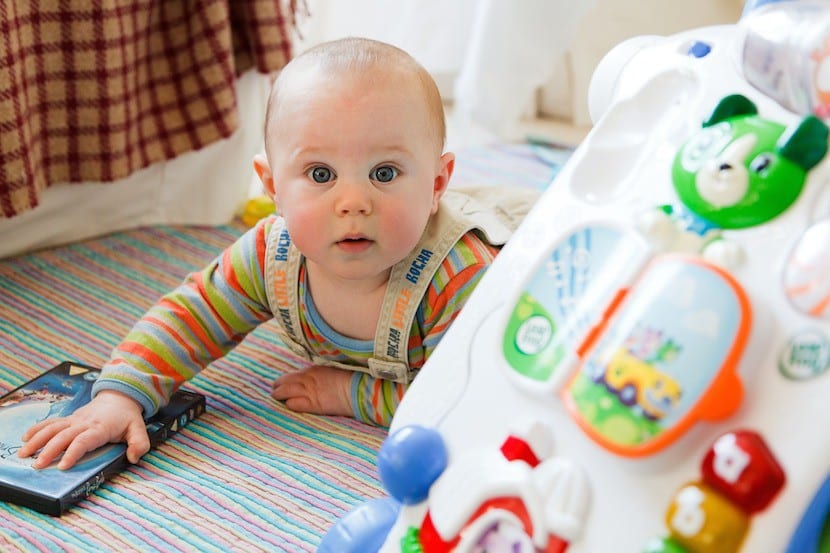
When a couple becomes parents one of their wishes is to listen to their baby speak, that is why the first words are very important. Human beings are social And the desire for communication is very strong, so parents are excitedly waiting for their child to start talking and communicating with them. But do not be in a hurry, it is necessary to respect the natural rhythm of babies, but you can stimulate speech.
Learning to speak is a process that begins from birth, when the baby experiences the sounds of voices. By the time the child is two years old, most babies have a large vocabulary (they understand it) and are able to express a few words in order to convey their needs. Today I want to talk to you about this magical process and what you can do to enhance and encourage your baby's speech ability to communicate with you.
From birth to three months
Before your baby was born he already heard your voice and now he does too. When he makes noises it is because he tries to imitate the sounds he hears. To stimulate your baby's speech, you can help him learn the different tones of the voice by singing lullabies, talking to him normally every day (tell him what you do at all times), etc. But remember that this is something that you can also do before it is born, when it is in your womb it will listen to you too!
It is also important that you get used to talking to your baby whenever you have him close. Even if he does not understand your words, he likes to see your smile and hear your voice, he will enjoy listening to you. Likewise, it is also necessary that you allow quiet time, babies need time to babble and play quietly without stimulation (no television, no music ...).

From 3 to 6 months
From three to six months, the baby is learning to differentiate how people communicate with each other. You can help him become a "talker" when you talk close to him, look him in the eye, and smile at him. If your baby babbles, you can imitate his sounds so that he knows that you are paying attention to him. If your baby babbles or tries to make the same sound as you, repeat it again to give him a chance to hear it.
Between the 6 and the 9 months
Between six and nine months, babies begin to play with sounds. Some of the words may sound like "baba" or "papa." Babies smile when they hear a happy voice and cry when they hear an angry person. Although the baby cannot understand the meaning of words, he can understand simple things like asking: «Who am I? Mommy!" Or maybe, "Where's the kitten?" and show where.
Between the 9 and the 12 months
Between nine and twelve months your baby will begin to understand simple words. He will be able to look at you and understand when you say "no" or "not that." If someone asks, "Where's Mommy," they will quickly look at you in response to that question. The baby will point, look, make sounds or use his body to convey what he wants. For example, if he wants you to pick him up, he may raise his arms up and make little noises as a sign that he wants you to pick him up. If he wants to play, he may give you a toy that he is holding.

It's time to start with "Hello" and "Goodbye." Even if he does not say it in words, he will be able to make movements with his hands to show the greeting and the goodbye. But remember that each child has their own rhythm and if at this age they are not yet able to understand or convey the greeting and farewell, you should not worry, they are still very young.
Between the 12 and the 15 months
Between twelve and fifteen months, babies begin to use words, so they will begin to say words "in their language" to communicate with you. For example, you can say things like: "fool" to say "balloon", "bus" to ask for water, and so on. Many babies can say 1 to 3 words at these ages but understand 25 or more. If you ask him to give you a toy he knows, he will give it to you. To enhance speech at these ages you can take into account the following:
- Name the things you use the most and give the child time to be able to name them
- Ask him questions about the things he sees every day (in the park, in stories, etc.) and give him time to name things. If you do not name it, do not give it importance and name it us so that you know what it is
- Smile and praise you every time you say the things you see
- Add information to the words you say. For example, if he says "dog" because there is a dog walking, you can say something like: "Yes, it is a very nice and very big dog, look how it wags its tail!"
- Listen to everything he has to say to you even if it does not make sense or it is difficult for you to understand
- Ask him everyday things that he may know the answer to.
- Give him options so that he is able to choose: "Do you want milk or juice?"
- Build sentences about what your child says. If, for example, it says, "ball," you can say something like, "It's a big red ball."
- Introduce the symbolic game to start the conversations in the game.

Between the 15 and the 18 months
Between fifteen and eighteen months, your child will begin to make more complex gestures to communicate with you and will also be building his vocabulary. He will be able to hold your hand, walk to the library, and tell you "story" to tell you that he wants you to read a story to him.
At this age if you say things like, "Where's the nose" and then point to your nose, he will soon be able to point himself to his nose when you ask him the same question. And then you can do the same with other easy to distinguish parts of the body such as the ears, fingers, eyes, mouth ... etc.
You can also stimulate his curiosity and initiative by hiding a toy while he is playing.. Then help him find it and then enjoy the joy of finding it. Another aspect to enhance his speech skills is to describe objects that are interesting to him in simple words. This way you will pay attention and begin to have more vocabulary.